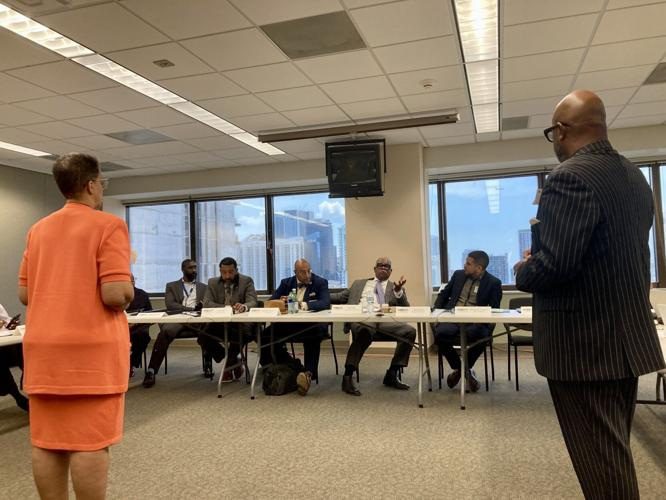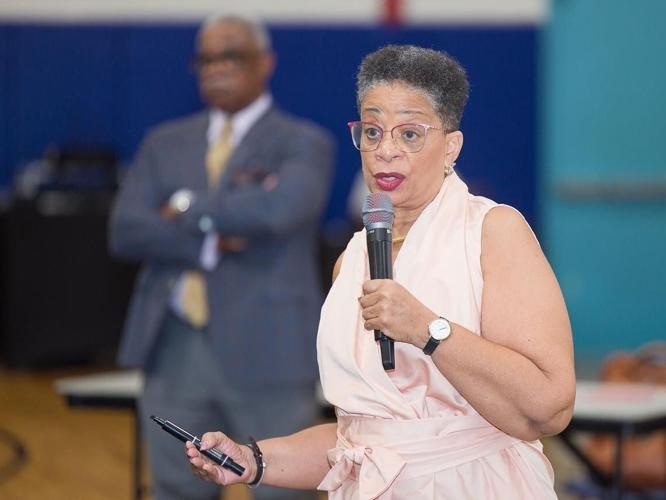Questions grow louder around study of Black community
More than $316,000 spent with little to show for it
By Johania Charles
On October 9, 2023

Nearly one week after the Miami-Dade Economic Advocacy Trust (MDEAT) was expected to release its highly anticipated study of disparities facing the local Black community, the report has not surfaced.
The Miami Times, however, was sent a copy of the study’s 43-page executive summary late Tuesday afternoon – a document that fails to include any supporting data of how many people were surveyed, the names of stakeholders and industry leaders interviewed, or where those interviews took place. It also contains numerous typos and unfinished sentences, leaving the reader in a state of confusion.Our investigation, published last week, revealed that CMA Enterprise Inc. and E.L. Waters and Company LLC, the firms mysteriously hired to produce the study without the traditional competitive bidding process, utilized highly questionable research methods – one that does not follow the standard practices of professional research firms that conduct scientific polling and use transparent, quantifiable techniques.
We revealed how $10,500 was charged to MDEAT for at least 13, two-hour community listening sessions held despite poor attendance, and how MDEAT was invoiced $6,200 for five interviews in June with community leaders, although two of them said they were never called.
Now we can add Miami-Dade County District 2 County Commissioner Marleine Bastien to the growing list of those who were purportedly interviewed in June, but never were. Bastien’s office confirmed to The Miami Times that the commissioner was never called by CMA. Others in the same boat include Rev. Dr. Walter T. Richardson, who chairs Jackson Health’s Public Health Trust, and Florida City Mayor Otis Wallace.
Miami-Dade County Commission Chair Oliver Gilbert III has evaded calls from The Miami Times to confirm whether he was interviewed in June for the study, as invoiced. Former Homestead Mayor Roscoe Warren hasn’t returned our calls, either.
All county commissioners were offered to be interviewed in the initial CMA-Waters proposal, but none have confirmed participation to date.

The study’s sketchy involvement of Georgia professor Edward Davis and students from Clark Atlanta University (CAU) has gone unexplained by CMA, but we now know that Diggs is a graduate of CAU and likely steered part of the business to the university. Nevertheless, during a presentation of study findings before MDEAT’s board last Monday, CMA president Gail Birks defended Davis’ involvement.
“We hoped to bring him in because we wanted not just a local perspective but also a national perspective,” she said. “He literally became an integral part of the team.”
Birks has refused to divulge how much Davis has earned in exchange for his collaboration.
She asserted last Monday that education was the area her company received the most feedback for, but The Miami Times has learned that – while a CMA progress report submitted to MDEAT dated April 30 names a vague “Miami Dade College vice provost” as one of those to be interviewed — there are nine vice provosts at MDC and Malou Harrison, MDC vice president and provost, told us she was never contacted to participate.

The county’s only Black school board members, Steve Gallon III and Dorothy Bendross-Mindingall, weren’t asked to participate, either, according to representatives in their respective offices. Miami-Dade County Public Schools (M-DCPS) has yet to confirm any involvement by its students or educators.
Also notable is that the initial proposal by the research firms listed former city of Miami Commissioner Jeffrey Watson as a member of the research team, though Watson maintains he was not involved.
Sources tell us Diggs is desperately politicking inside County Hall to salvage the study’s reputation and perhaps his own. An op-ed about the study was published in The Miami Herald this week with his byline but did not contain any corroborating data for the mentioned findings.

Unsubstantiated disparities
Though excerpts from the executive summary shared by Birks with the MDEAT board in a PowerPoint presentation last week outlined some disparities within the county’s Targeted Urban Areas (TUAs), the lack of documentation is concerning because MDEAT’s legislative agenda is supposed to be justified and shaped by findings from this study.
A disparity study attempted in 2021 by Keen Independent Research out of Phoenix was halted by Diggs shortly after he joined MDEAT and after the company had already been paid $108,697.
The county agency has spent more than $316,000 in total on the study between its contract with Keen and CMA-Waters.
Elbert Waters, who heads E.L. Waters, attributed their study’s findings to a review of unsourced industry articles, score cords, industry reports, commissioned studies, independent research and anonymous surveys from an unspecified number of residents, businesses, service providers, MDEAT board members and staff.

The CMA-Waters presentation cited “several” unidentified elected officials who allegedly said constituents aren’t being vocal about disparities; that big-box retailers are taking over Black communities; that there is a demand for affordable transportation; that concerns about crime aren’t being addressed; and that complacency among Black voters exists.
“We interviewed past and present elected officials,” Birks told the board. “The commentary was a little bleak in some instances.”

Birks said unnamed public administrators want to build a stronger relationship with MDEAT. Those same administrators who CMA-Waters claims were interviewed identified the development of the Poinciana Industrial Site in Liberty City and a robust plan for affordable and workforce housing as necessities in the Black community. They also reported Black residents are concerned about being “pushed into the sea,” although no further details were provided.
The CMA-Waters presentation claimed educators spoke to them about how mental health, a high drop-out rate, insufficient funding to support quality education in TUA schools and abuse in the home are contributing to disparities in education. It also cited an unsubstantiated allegation that the high cost of living is forcing more students and their families to live in cars.
CMA said criminal justice stakeholders its team reached out failed to respond, forcing them to rely on a 2018 ACLU report for its summary. Issues referenced included overpolicing in Black communities, increasing gun violence in TUAs, and higher arrests and sentencing rates for Black and Black Hispanics compared to white counterparts, all of which has been widely reported in the media.
Regarding businesses and economic development, the firms said they polled capital providers – again unidentified – leading to a discovery of disparities due to insufficient collateral by minority applicants. A lack of credit was also cited as a major barrier to success, along with insufficient resources for businesses to pay for services they need. Although all of this has been reported in the media for decades, Birks credited a two-hour interview with Black Business Investment Fund for some of the feedback generated on this topic.

As reported in last week’s Miami Times, Birks said community participation in surveys and listening sessions was low, though she would not disclose response rate percentages. The number of returned surveys from MDEAT’s own staff and board member surveys was also low.
“We were a little sad that we didn’t get the feedback that we wanted from the survey, but we also saw that people are afraid to document … afraid to put stuff in writing,” said Birks regarding the anonymous surveys reportedly sent out to residents countywide.
It appears that CMA-Waters and MDEAT are just as reluctant to document, as evidenced by the lack of data in the executive summary and an unanswered public records request by The Miami Times that would help substantiate it.
Site reviews
Waters said he conducted site reviews of the TUAs with a group of unnamed FIU architecture students for the second part of the study. The team did, however, name and acknowledge five student interns from The Optimist Foundation of Greater Goulds as contributing to the study, but the extent of their participation is unclear. According to Birks, about 12 to 15 students joined the project as paid interns.
The TUAs are listed as Opa-locka, West Little River, Brownsville, Little Haiti, Model City, Liberty City, Coconut Grove, South Miami, Richmond Heights, Perrine, Goulds, Naranja, Leisure City, Southwest Homestead, Princeton, North Miami and Biscayne Boulevard.
These site reviews consisted of driving through TUAs and examining the conditions of homes and surrounding buildings. Waters said the sites were photographed, but no photos were provided during the presentation to MDEAT’s board.
“We’ve taken not only pictures, but we’ve done assessments of what’s there … the conditions of the streets … housing … commercial areas within those particular areas,” said Waters.
Through the site reviews, CMA-Waters concluded that the majority of the TUAs contained boarded housing and empty lots and lacked major businesses. They also found that more food deserts were present in South Dade compared to northern parts of the county. Also reported were highways and rapid transit systems running through core parts of these neighborhoods, as well as higher housing costs, the latter of which is common knowledge.
Recommendations
The consultants recommended that the agency advocate for more senior housing, meet with elected officials, do a better job of engaging the community to inform county residents of MDEAT’s mission, offer financial literacy education, host quarterly town halls, and reconsider the composition of its board to include more professionals with a background in mental health, immigration and health care.
No date has been provided for when the final report will be presented to the County Commission Board, let alone to the public.
This piece was republished from The Miami Times.